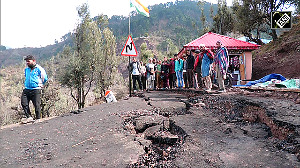"Some information in the CIA charge-sheet was so damning that the Pakistanis could not deny them," a senior official familiar with the talks told the Pakistani Dawn newspaper. Diplomatic and US sources said the allegations included in the 'charge-sheet' were almost identical to what The New York Times had reported on Wednesday.
The US daily had also reported about CIA deputy director Stephen R Kappes' secret visit to Islamabad last month to confront Pakistan with information about the ISI's links with militants in the northwestern tribal areas. CIA chief Hayden, who met Gilani at a dinner on Monday, is believed to have told the Pakistani prime inister that Pakistan will have to do something about the alleged involvement of ISI officials with militants.
Hayden also told Gilani that even a change of government in Washington would not help Pakistan as whoever occupied the White House in January would want Islamabad to "rein in the ISI", said the senior official.
US President George Bush too expressed concern and some annoyance over the leaking of information to terrorists by the ISI during his meeting with Gilani on Monday. Bush told Gilani that Washington is reluctant to share intelligence with Islamabad because people in the ISI are passing on such information to militants.
In an interview to the Washington Times, Gilani confirmed The New York Times report that Kappes and Admiral Michael G Mullen, chairman of the US Joint Chiefs of Staff, visited Islamabad in mid-July with reports of the alleged links of some ISI officials with militants.
Asked whether he was confident that the ISI contained no pockets of Taliban sympathy, Gilani said: "I am pretty sure about it." But he added: "We will still have to look into (the accusations)...It will be resolved."
Kappes had presented evidence showing that members of the ISI had deepened their ties with some militant groups responsible for a surge of violence in Afghanistan.
Diplomatic sources noted that by leaking this information to The New York Times while Gilani was still in Washington, the US administration tried to convince the Pakistanis that they "were really upset" over this issue. The sources also noted that while previous leaks on this issue quoted unnamed sources, this report directly quoted senior CIA officials.
According to diplomatic sources, the US is trying to work out an arrangement with Pakistan for curtailing the ISI's power. Under this new arrangement, the ISI wing that deals with internal security may be transferred to the interior ministry and the agency may be asked to reduce its role in the war on terror.
"While the ISI may still have some role in both internal security and the war on terror, it will be not be as influential as it is today...At least this is what the Americans and Pakistanis hope to achieve," said an official familiar with the talks.
Reports suggested that the US wanted to talk about the ISI during Gilani's visit because they believed that at least some people within the spy agency had links to the Taliban and al-Qaeda. Senior Pakistani officials who accompanied Gilani too confirmed this, saying that they had come prepared for "tough talks" on this issue.
The expression of concerns by the US came days after the Pakistan government reversed a formal notification issued by the Cabinet Division to place the ISI and the Intelligence Bureau under the interior ministry. The government withdrew the notification due to pressure from the powerful army and the Presidency.
Pakistani officials who travelled to the US with Gilani tried to dispel the impression that Islamabad was working on "some formal or informal arrangement" with Washington for curtailing the ISI's powers. They pointed out that during his talks at the White House and with senior State Department and Pentagon officials, Gilani had urged them to "look at the Afghan and India factors as well".
On Wednesday, Rehman Malik, Gilani's adviser on Interior Affairs, accused India and Afghanistan of stirring trouble in the tribal areas and Balochistan. Pakistani officials said that by charging India and Afghanistan, the government is trying to fend off the US attack on the ISI.






 © 2025
© 2025